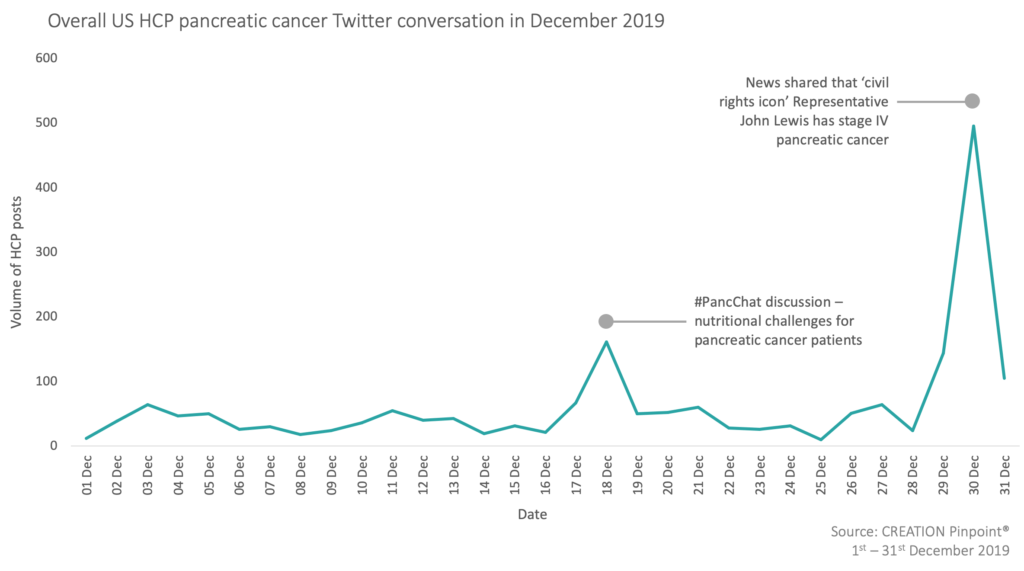Receive monthly updates on the ongoing pancreatic cancer conversation from HCPs online. Sign up for these insights to be delivered direct to your inbox.
On the eve of a new decade filled with hope for pancreatic cancer, news was shared that Representative John Lewis, a ‘civil rights icon’ had been diagnosed with stage IV pancreatic cancer. Healthcare professionals (HCPs) were quick to share their sympathies and prayers with Lewis and his family including resident physician, Danielle Ward.
Incredibly saddened at the news of Rep. John Lewis being diagnosed with stage IV pancreatic cancer. Prayers up for him and his family during this difficult time 🙏🏾 pic.twitter.com/1PEX12kGHl
— Danielle Ward, DO, MS (@minoritydoctor) December 30, 2019
Following on from news in 2018 and 2019 of Aretha Franklin and Alex Trebek, HCPs continue to share media stories of well known public figures who have been diagnosed with or passed away due to pancreatic cancer. As the sad news was shared, HCPs were among the well wishers and used the opportunity to raise awareness of the disease and to encourage a continued fight against it.
This news also demonstrates the need for care in the way pancreatic cancer is discussed in relation to the way the patient faces it. One journalist posted the news and commented “I’ve known John for over 50 years and he’s always been a fighter, undeterred”. Replying to this, Benjamin Neel, a cancer researcher in New York objected to the use of militant language in the post. He suggested by implying cancer is a battle it places blame on the patient for “losing the war”: that they did not fight hard enough. However, in this instance, Leonidas Platanias a medical oncologist and the Director of the Lurie Cancer Center of Northwestern University defended the use of the language saying he does not “think it blames the victim at all.”
I get your point, but I dont think it blames the victim at all. This is an asymmetric warfare! Much more than other diseases.
— Leonidas Platanias, MD (@LeonidasPlatan1) December 30, 2019

The other point in the month which saw HCPs gather online to discuss pancreatic cancer was the ‘last PancChat of the decade’. The #PancChat Twitter chat is organised on a regular basis by Let’s Win Pancreatic Cancer and this time was co hosted by various physicians. HCPs, particularly oncologists, use social media at a fixed time to have a specific conversation and use the hashtag #PancChat. The primary topic of the #PancChat in December was ‘Nutrition and Pancreatic Cancer’.
Welcome to #PancChat! Tonight we are chatting about #Nutrition and #PancreaticCancer. pic.twitter.com/3dFDLOxUi4
— Let's Win Pancreatic Cancer 💜 (@letswinpc) December 18, 2019
The host posed a number of questions for discussion. HCPs particularly engaged in two questions which were ‘how are a lack of digestive enzymes managed for patients who have had surgical procedures for pancreatic cancer such as a Whipple procedure?’ and ‘do you have tips for managing nutrition challenges with pancreatic cancer?’. Senior Clinical Dietitian at The University of Texas MD Anderson Cancer Center, Maria Petzel, was highly engaged in December’s #PancChat. She shared tips for patients relating to poor appetite and nausea.
A6.1 For poor appetite: plan meals and snacks the night before and eat because it is time to, even if it is just a few bites of food. #PancChat
— Maria Petzel RD CSO (@MariaPetzel) December 18, 2019
A6.2 For poor nausea: use anti-nausea medication aggressively. Avoid high fat or highly spiced foods. Avoid favorite foods. Stay hydrated, consider use of a high protein clear liquid supplement. #PancChat
— Maria Petzel RD CSO (@MariaPetzel) December 18, 2019
The use of Twitter chats continues to show its effectiveness at engaging HCPs in a disease specific area online. However, looking at December 2019 as well as historic data it is clear to see that celebrity diagnosis in the area of pancreatic cancer is also a key driver in raising the awareness level, as seen in the conversations among HCPs online.
READ LAST MONTH’S PANCREATIC CANCER TRACKER
The shifting pancreatic cancer landscape highlights need for educational content
Methodology
- This article analysed the Twitter conversations of HCPs in the US, between December 1st – 31st 2019, using CREATION Pinpoint®.
- Between December 1st – 31st 2019, 1,010 US HCPs posted over 1,900 posts about pancreatic cancer on Twitter.
The cover image is a false colour SEM image of pancreatic cancer cells, grown in culture.
CREDIT: Anne Weston, Francis Crick Institute used under Creative Commons License.
 By Jamie Doggett
By Jamie Doggett 
